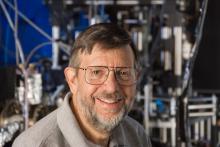Scientists must rely on a system of units to provide a quantitative description of our universe. The International System of Units (the SI, or Metric system) starts with seven base units from which all measurable properties of objects and phenomena can be expressed. The universal and international character of science strives for the standards that define the units—necessary for the effective scientific communication that underpins the longstanding and continued success of science—to be unambiguous, precise, constant and accessible to everyone.
On May 20, 2019, World Metrology Day, the international metrology community adopted revolutionary changes to the SI wherein all of the base units of measure are defined by fixing the values of constants of nature. The SI is now firmly based on quantum methods of measurement. The talk will explain why we needed such reform and how we achieved it.
William D. Phillips received a B.S. in physics from Juniata College in 1970, and his Ph.D. from the Massachusetts Institute of Technology in 1976; after two years as a postdoctoral researcher at MIT, he joined NIST (then the National Bureau of Standards) to work on precision electrical measurements and fundamental constants. There, he initiated a new research program to cool atomic gases with laser light. He founded NIST’s Laser Cooling and Trapping Group, and later was a founding member of the Joint Quantum Institute, a cooperative research organization of NIST and the University of Maryland that is devoted to the study of quantum coherent phenomena. His research group has been responsible for developing some of the main techniques now used for laser-cooling and cold-atom experiments in laboratories around the world. Their achievements include: the first electromagnetic trapping of neutral atoms; reaching unexpectedly low laser-cooling temperatures, within a millionth of a degree of Absolute Zero; the confinement of atoms in optical lattices; and coherent atom-optical manipulation of atomic-gas Bose-Einstein condensates. Atomic fountain clocks, based on the work of this group, are now the primary standards for world timekeeping. Among the group’s current research directions are the use of ultra-cold atoms for quantum information processing and quantum simulation of important physical problems.
Dr. Phillips is a fellow of the American Physical Society, the American Association for the Advancement of Science, and the American Academy of Arts and Sciences. He is a Fellow and Honorary Member of the Optical Society of America, a member of the National Academy of Sciences and the Pontifical Academy of Sciences, and a corresponding member of the Mexican Academy of Sciences. In 1997, Dr. Phillips shared the Nobel Prize in Physics "for development of methods to cool and trap atoms with laser light."
